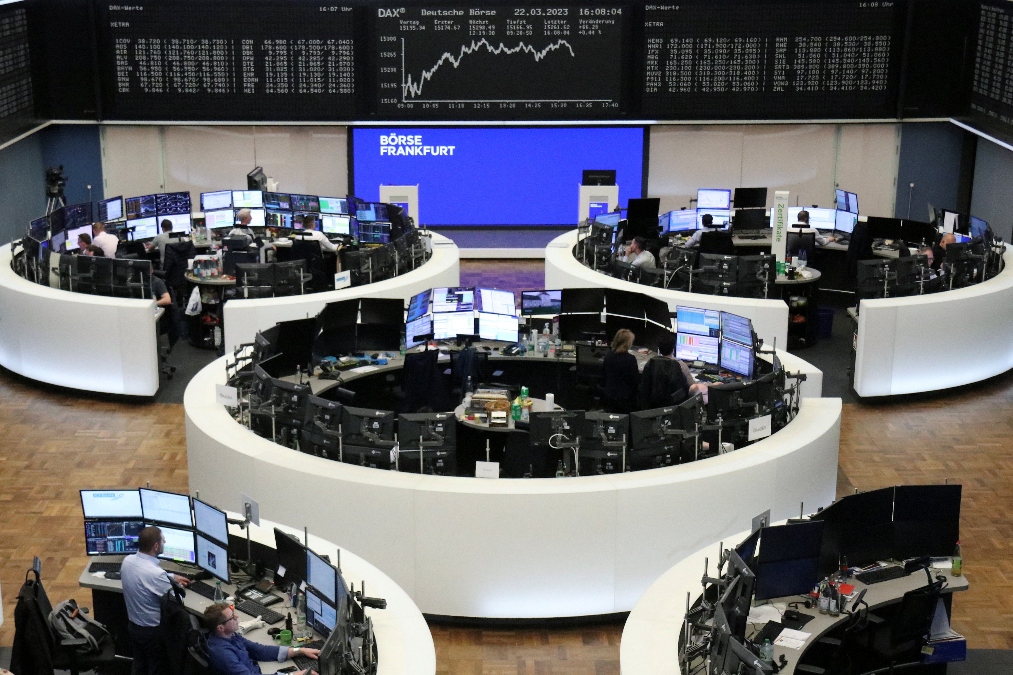
Global stocks came under pressure on Friday from lingering concerns about the stability of the banking system, while safe-haven buying supported government bonds.
The MSCI World share index traded 0.6% lower and Europe’s STOXX 600 index was down 1.6%.
A STOXX sub-index of bank shares, which has swung wildly as traders debated if a forced tie-up last weekend between Credit Suisse and UBS marked stability or systemic stress, dropped by 5.9% on Friday, heading for its third consecutive week of declines.
Shares in Deutsche Bank plunged 13% as its credit default swaps, which reflect the cost of insuring debt against the risk of non-payment, climbed to a four-year high.
The German lender also announced plans to redeem $1.5 billion of tier 2 debt due not due to be repaid until 2028.
The moves highlight just how frail sentiment remains after turmoil in the banking sector revives memories of the 2008 global financial crisis.
On Wall Street, futures tracking the blue-chip S&P 500 share index fell 0.7% and those on the technology-focused Nasdaq 100 edged 0.4 lower.
Investors said that institutions were offloading financial sector exposure ahead of the weekend.
“People don’t want the weekend risk,” said Ed Hutchings, head of rates at Aviva Investors in London.
“Nothing untoward may be going on, but people are risk covering. The situation will almost get to excess and then it could snap back if there is nothing systemic.”
U.S. Treasury Secretary Janet Yellen this week tried to assuage investor fears about the health of U.S. lenders and the economic ramifications of a potential lending crunch if depositors flee smaller banks, which have outsized roles supporting key sectors such as commercial real estate.
“I don’t expect this volatility (in bank stocks) to subside anytime soon,” said Peter Doherty, head of investment research at private bank Arbuthnot Latham in London.
U.S. regional banks Silicon Valley Bank and Signature Bank failed this month and First Republic Bank shares have lost most of their value.
On Thursday, Yellen pledged further action to safeguard bank deposits, after saying a day earlier that blanket insurance was unlikely. Banks borrowed $110.2 billion at the Federal Reserve’s discount window in the latest week, with the hefty drawdown of emergency credit suggesting some lenders were now unable to secure funds elsewhere.
The Fed raised its main interest rate by a quarter point to a range of 4.5%-4.75% on Wednesday, but signalled it would consider a pause in light of banking system stresses.
Markets, however, are betting on a U.S. recession and incoming rate cuts.
As U.S. financial conditions tighten, said Arun Sai, senior multi-asset strategist at Pictet Asset Management, “this takes us closer to a hard landing, to a U.S. recession.”
In government bond markets, the yield on the two-year U.S. Treasury, which tracks interest rate expectations, fell 16 basis points (bps) on Friday to 3.64%.
Ten-year yields fell 9 bps to 3.31%, after edging 9 basis points lower in the previous session. Bond yields fall as prices of the debt instruments rise.
By midday in London, traders were pricing in U.S. rate cuts of about 105 bps basis points to about 3.9% by the end of the year, up from about 88 bps earlier in the session.
Euro zone government bond yields followed Treasury yields lower, with the 2-year German yields down 19 bps to 2.306%.
In currencies, the dollar reversed a losing streak to gain 0.6% against major peers as risk aversion strengthened appetite for the reserve currency.
The Japanese yen, a safe-haven currency, climbed 0.6% to a six-week high of 130 per dollar, extending its weekly rise to a solid 1.4%. The euro fell 0.9% to $1.073.
Brent crude, the global oil benchmark, fell 2.8% to $73.11 per barrel.
(Reuters)
Inside Telecom provides you with an extensive list of content covering all aspects of the Tech industry. Keep an eye on our News section to stay informed and updated with our daily articles.